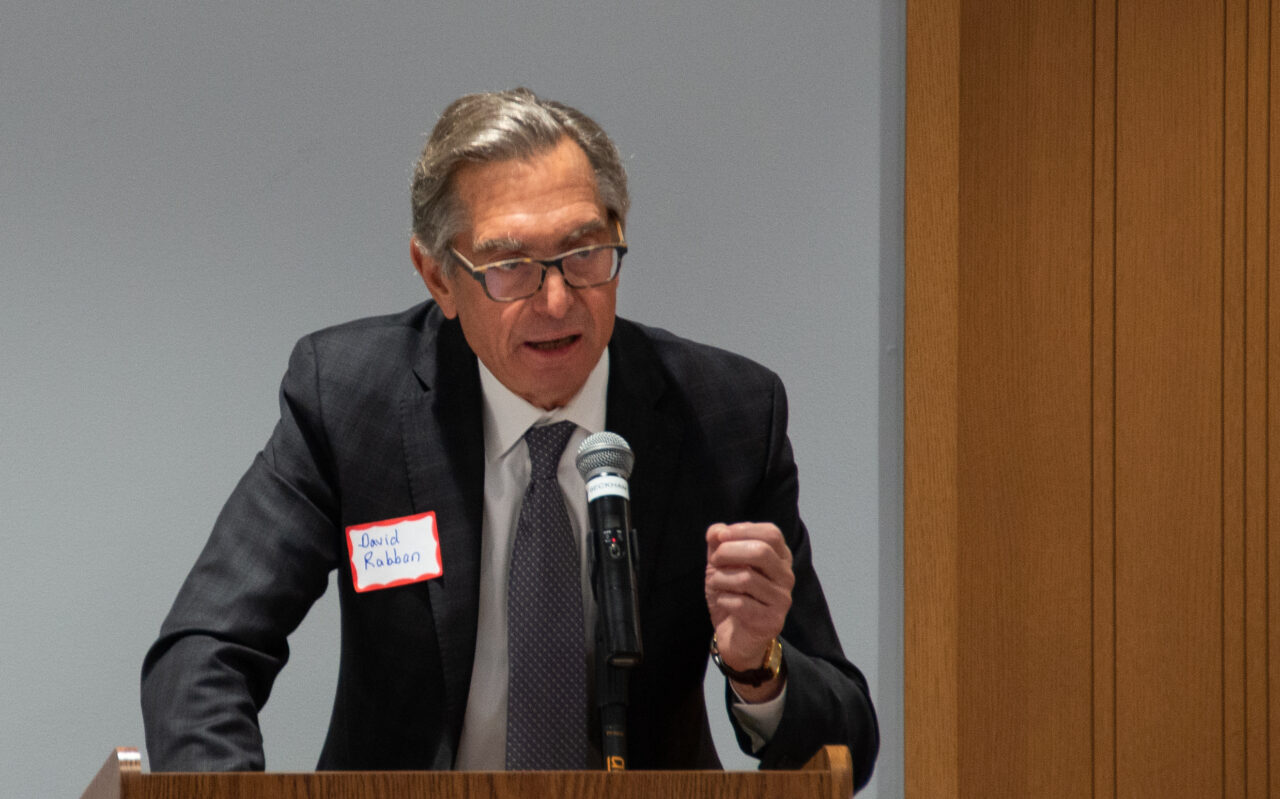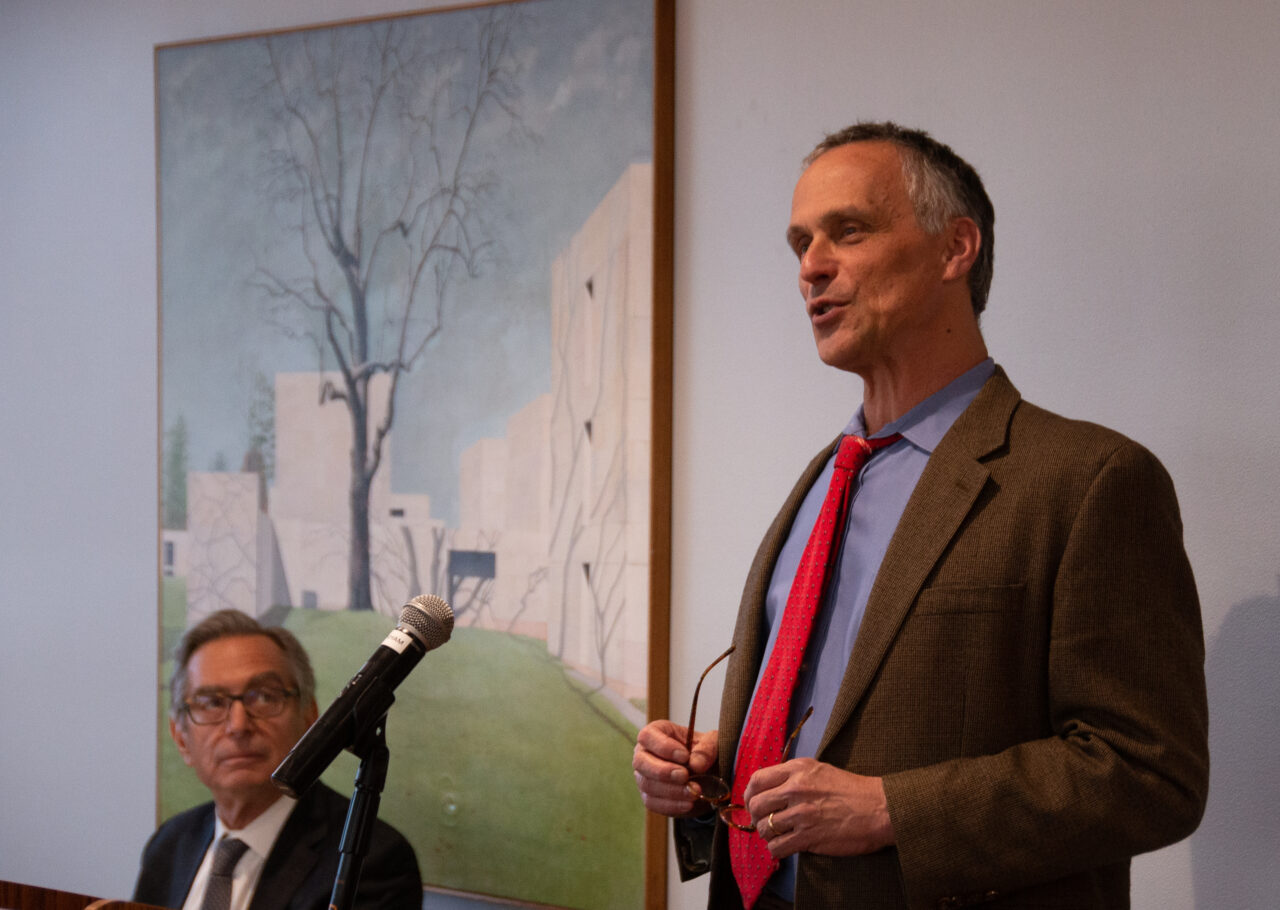Annual Hugo Black Lecture Explores Academic Freedom

David Rabban ’71, a professor at the University of Texas at Austin School of Law, delivered a wide-ranging exploration of academic freedom and freedom of speech at the annual Hugo L. Black Lecture on Freedom of Expression.
The lecture was presented by The Allbritton Center for the Study of Public Life and took place March 30 in the Daniel Family Commons. “One of the things I loved about Wesleyan when I was here was the commitment of the faculty and administration to free speech and academic freedom,” Rabban said.

His talk cited a wide array of case law to show that courts have wrestled with this topic since theories of evolution taught in schools were debated in the 19th century. Academic free speech received widespread attention from the public but didn’t make regular appearances in the judiciary until the 1950s, when governmental fears that Marxism was being taught in higher education began to have a chilling effect on academia.
Public universities are afforded free speech protections under the First Amendment, not private universities. However, private universities have consistently extended the same level of protection to their communities, he said.
In addition, while courts have recognized academic freedom as a First Amendment right, Rabban said there had been many cases where judges have not referred to academic freedom in circumstances where it clearly applies.
“Courts have clearly recognized academic freedom as a First Amendment right of professors and universities, but the meaning of this right and its relationship to other First Amendment rights remains unclear,” Rabban explained.
Rabban posited his own theory about academic freedom as a subset of First Amendment law, proposing the creation of a distinctive First Amendment right to academic freedom that applies to professors, universities, and students, though in different ways.
“To my mind, a convincing theory of First Amendment academic freedom must differentiate academic freedom from general First Amendment rights of free speech while explaining why academic freedom fits within the First Amendment,” Rabban said.
One of the main functions of universities is the production and dissemination of knowledge. The societal value of professors’ expert academic speech in their respective subject and matters of educational policy contributes to participation in a democratic society—a core value at the heart of the First Amendment.
However, Rabban does not see that right extending to speech by professors unrelated to their areas of expertise or about external political issues. “In my view, this non-expert expression should be governed by the same general First Amendment applications as for public employees,” he said.
There is one way Rabban differs from some freedom of speech absolutists. “I think universities should have an institutional opportunity to regulate some offensive speech on campus that interferes with the educational process even if that speech would be protected in the public sphere,” Rabban said.
He points to an incident in 2017 at the University of Texas-Austin as an example. Hate flyers that would likely be afforded the broad protections of First Amendment free speech were distributed on campus. He believes the university could, and should, remove them from campus. “A university could legitimately conclude on educational grounds that those flyers undermine the learning environment,” Rabban said.
On the flip side of that, Rabban believes that classroom academic discussion should not be regulated. “Exposure to ideas, including ideas that may be so offensive that they make it harder for some students to learn, I acknowledge that, is a fundamental part of the educational process,” Rabban said.
This annual lecture is designed to bring to Wesleyan University public figures and scholars with experience and expertise in matters related to the First Amendment and freedom of expression. This lecture is endowed by Leonard S. Halpert ’44 (1922–2017), who believed that the First Amendment to the US Constitution is the basis upon which we enjoy all other Civil Rights. This lecture is named in honor of U.S. Supreme Court Justice Hugo L. Black.

